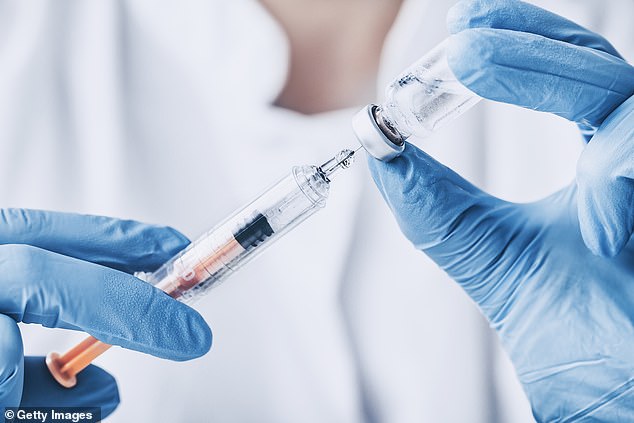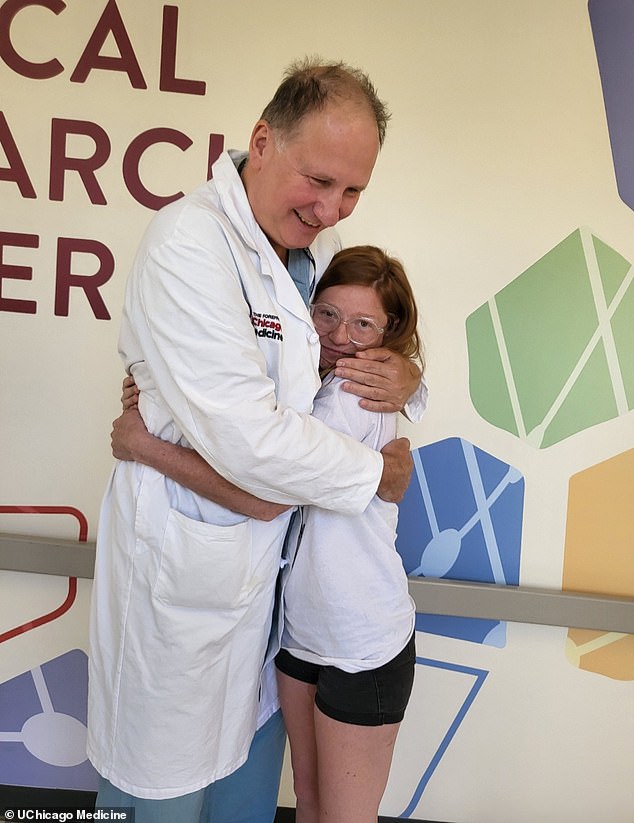A man with type 1 diabetes was cured of the condition after a first-of-its-kind procedure, experts have revealed.
The 42-year-old from Sweden was diagnosed with type 1 diabetes at just five years old, which caused his body to not produce enough insulin to control blood sugar.
But today he no longer needs daily insulin shots and can finally enjoy sugar without stress, doctors wrote in a medical journal this month.
Last year, the man underwent an islet cell transplant, which involves transplanting islet cells into the liver to help the pancreas produce insulin on its own. Islet cells are cells in the pancreas that produce hormones to help regular blood sugar levels.
This was done with a series of injections in the man’s forearm muscle.
Over the next three months, his body responded to the transplanted cells and started to make its own insulin in response to glucose spikes, which usually happen after meals.
While islet cell transplants have been performed in a handful of patients, the man was the first to have his islet cells genetically engineered so his body wouldn’t reject them.
This helped him avoid having to take immunosuppressant drugs, which weaken the body’s defense system and leave it vulnerable to dangerous infections.

A 42-year-old man in Sweden was cured of his type 1 diabetes after receiving an islet cell transplant (stock image)
Your browser does not support iframes.
About 1.6million Americans are diagnosed with type 1 diabetes. It’s much less common than type 2 diabetes, which affects 32 million Americans and typically comes on later in life due to a confluence of lifestyle factors and genes.
Without insulin, type 1 diabetics’ bodies have no way to regulate blood sugar, which can build up in the bloodstream and skyrocket.
The body starts breaking down fat for fuel, creating ketones, or acidic byproducts. A buildup of ketones in the blood can cause diabetic ketoacidosis, a condition that causes nausea, vomiting, rapid breathing, dehydration, and confusion.
Without proper treatment with insulin and fluids, diabetic ketoacidosis can cause a laundry list of potentially fatal effects, including brain swelling, kidney failure, cardiac arrest, and death.
Islet cell transplantation involves taking islet cells, which live in the pancreas and produce insulin, from a healthy or deceased donor and injecting them into a person with type 1 diabetes.
The unidentified man got his cells from a living donor.
Currently, islet cell transplants are estimated to cost around $100,000.
Patients normally have to take immunosuppressant drugs for weeks or months after the procedure because the body thinks transplanted cells are foreign and dangerous and will mount the immune system to kill them.
The drugs help stop that response and prevent the immune system from attacking the new cells.

Marlaina Goedel (pictured), 30, was just five years old when she was diagnosed with type 1 diabetes. She has now been cured with an islet cell transplant

Goedel (right) calls Dr Piotr Witkowski (left), who conducted her clinical trial, her ‘superhero’ for taking her case
However, in suppressing the immune system, these drugs leave patients vulnerable to severe infections from something as simple as a cold.
To avoid this, the man’s transplanted cells were modified with CRISPR, a type of gene editing usually used for cancer patients, to personalize the cells to the man’s immune system.
The technique had previously only been used in mice and monkeys.
After three months, the man’s transplanted islet cells began producing insulin without the need for immunosuppressant medications.
He had a handful of minor complications like vein inflammation, an infected ulcer on his fingertip, excessive sweating and arm numbness, all of which have subsided.
The man is one of a handful of patients to receive an islet cell transplant and essentially be cured of type 1 diabetes.
Like the man in the case report, Illinois mother-of-one Marlaina Goedel, 30, was diagnosed with type 1 diabetes at five years old.
Within four weeks of the procedure, she no longer had to take insulin. Goedel previously told DailyMail.com: ‘The cure is out there.’
Goedel was part of a recent clinical trial involving an islet cell transplant run out of the University of Chicago Medicine Transplant Institute.
However, her cells were from a deceased donor, and she did require an immunosuppressant drug after the procedure.
She told this website that for the first time in her life, she can ride her horse and spend time with her daughter without worrying about a blood sugar crash. She is also going back to school to become a horse massage therapist.
She said: ‘It took a while to get used to saying, “I am cured. I am diabetes free. It’s been very freeing.
‘No one should have to live with this disease. I know that now more than ever.’
